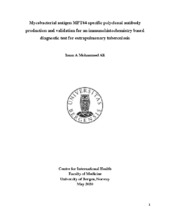| dc.description.abstract | Mycobacterial antigen MPT64 specific polyclonal antibody production and validation for an immunohistochemistry based diagnostic test for extrapulmonary tuberculosis Background: Tuberculosis (TB) is a major health problem, especially in low- and middle-income countries. Extrapulmonary TB (EPTB) constitute 20-40% of all TB. Diagnosis of EPTB poses challenges as the routine diagnostic tests are less sensitive due to the paucibacillary nature of the disease. Therefore, there is a need to develop better diagnostic tests for EPTB. An antigen detection test based on the detection of Mycobacterium tuberculosis complex specific protein MPT64 by immunohistochemistry (IHC) has been developed and validated in the routine diagnostic settings (1-8). These studies show that the MPT64 antigen detection test is applicable to various forms of EPTB, including HIV positive and HIV negative cases, on biopsies, fine-needle aspirates, and cytology smears with sensitivity 70-100% and specificity 65-100% which is significantly better than the routine tests. This test is robust, feasible to implement in high TB endemic settings (2), and can help in the timely and accurate diagnosis of EPTB, preventing empirical over-treatment, morbidity, and mortality. These findings warrant the large-scale implementation of the test. However, all these studies have been carried out by the limited amount of in-house rabbit polyclonal antibody (pAb). The reproduction of an anti-MPT64 antibody with applicability on IHC is a prerequisite for large-scale use of the test. Our research group has reproduced a monoclonal anti-MPT64 antibody which gives good reactivity with enzyme-linked immunosorbent assay (ELISA) against the recombinant antigen, but it does not give good reactivity on formalin-fixed tissues. This is probably due to variable epitopes in vivo and changes in the antigen during the fixation process. PAbs, by virtue of their polyclonality and heterogeneity, can bind to multiple and different antigenic epitopes, and could be a suitable candidate for IHC. Aims: The aim of this study was to reproduce the anti-MPT64 pAb, create a single batch in a large volume, validate the new pAb on formalin-fixed clinical samples, and compare the validity with Xpert MTB/RIF assay. Material and Methods: Recombinant MPT64 protein was prepared by using a mammalian cell expression system. Rabbits were used as host animals for the generation of pAbs. An immunization strategy was designed by a pre-immunization selection of 38/180 rabbits with minimal reactivity of their sera on the formalin-fixed tissues by IHC. The 38 selected rabbits were immunized by recombinant antigen and Titer Max Gold adjuvant by using a shorter and longer immunization protocol generating 50 ml and 90 ml of sera, respectively from each rabbit. Individual bleeds from each rabbit were tested with ELISA and IHC. Sera with good reactivity by IHC on the formalin-fixed TB positive control tissues and minimal reactivity on the non-TB tissues were further tested by making various cocktails to generate a single batch in a large volume. Various background reducing strategies were applied to achieve good specificity. These batches were tested on human clinical samples. The selected batch was validated on bacteriology confirmed (culture and/or Xpert MTB/RIF positive) EPTB (24 lymphadenitis and 21 pleuritis) and 41 non-TB biopsies by IHC. The sensitivity of the new pAb was compared with the microscopy for acid-fast bacilli and Xpert MTB/RIF assay using culture as a reference standard. Results: All bleeds had very good reactivity with ELISA, with titer mostly around 1:200.000. With IHC, reactivity with the individual bleeds was variable, some sera gave very good sensitivity and specificity, while others were less sensitive and/or less specific due to the non-specific background staining. Among the various background reducing strategies, overnight incubation of tissue sections with 3% bovine serum albumin and 10% normal goat serum followed by further blocking with serum-free protein block gave good results with a significant reduction of non-specific staining. Among five cocktails made from sera of 25 rabbits, one cocktail consisting of sera from 10 rabbits gave the best results. The sensitivity of this cocktail was similar to the previous anti-MPT64 pAb, though the staining intensity was generally less, the signals were clearly visible. Using bacteriological confirmation as a reference standard, the sensitivity, specificity, positive and negative predictive values, and accuracy of IHC with this batch of new pAb in lymphadenitis were 88%, 80%, 72%, 92%, and 83%, respectively, and in pleuritis were 86%, 80%, 69%, 92%, and 82%, respectively. Using culture as a reference standard, the performance of the new anti-MPT64 pAb was better than AFB microscopy in both lymphadenitis and pleuritis (sensitivity 88% vs. 13%, and 89% vs. 6%), while it was better than Xpert MTB/RIF in the TB pleuritis (sensitivity 89% vs. 17%) and similar to it in lymphadenitis (sensitivity 88% vs. 88%). Conclusion: The study shows that it is possible to reproduce pAbs that can detect the MPT64 antigen in the formalin-fixed paraffin-embedded tissue sections by IHC. The sensitivity of the MPT64 antigen detection test by using these new pAbs is better than the AFB microscopy and Xpert MTB/RIF. This opens up the possibility of the large-scale use of this test and its inclusion in the routine diagnostics of EPTB. | en_US |
